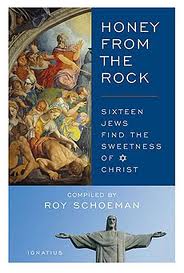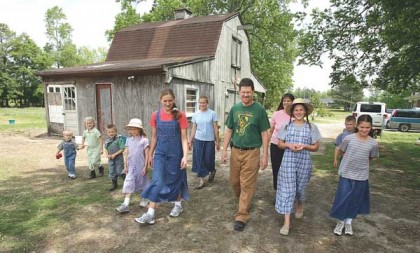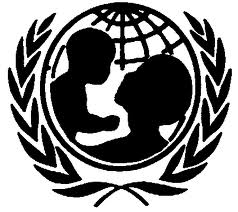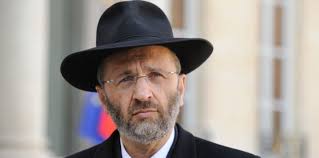Should We Redistribute the Children?
Devra Torres | Feb 10, 2014 | 6 cmts
When I was seven, my parents, my little sister, and I joined a cult which later made headlines for all kinds of bizzare and criminal conduct.

We only lasted two days. There were red flags, but my parents, brand-new Christians, mistook some of them for radical, early-Church-style discipleship. (Also, the classic signs of cults were not so well publicized then as they are now.)
Still, there was one thing they couldn’t swallow: the part about sending my little sister and me away to be “educated” in another city. So after two days, we were done.
You can read the whole story of our family’s conversion in my mother’s hilarious chapter of this book.

Getting ahold of the children as early as possible is a favorite tactic of cults, as well as other totalitarian systems. Persuade the parents to delegate their authority, early communists reasoned, and there’s no longer an excuse for the institution of marriage to interfere with your plans. The collective IS the family. No more pesky “mediating institutions.”
This kind of thinking has always been notoriously unpopular in America.

When Hillary Clinton announced back in 1996 that it took a village to raise a child, it didn’t go over well. As someone pointed out at the time, within the traditional African culture where the proverb originated, the village was the tribe—that is to say, the (extended) family.
More recently—just last year—Melissa Harris-Perry of MSNBC raised a small ruckus by opining that the children belong to “the collective.”
Last week, there was another minor brouhaha when one Common Core advocate was heard to utter, “the children belong to all of us” (though he really just seemed to mean that academic standards should be national because children tend to move from state to state).
More barefacedly, the UN Committee on the Rights of the Child urged the Catholic Church to jettison some core teachings, including (ironically enough) protection of the unborn—“for the sake of the children.” The Committee seemed to take an oddly parental interest in those children.

Other cases showing an unseemly eagerness to remove certain minors from their homes have gotten press here and there, but no great outcry has arisen. A tiny segment of the population gets incensed; but most people don’t hear about it at all. At least, that’s my impression. We’re getting used to the idea that children don’t necessarily “belong” to their biological parents.
Why is that? I can think of three reasons:
- First, there’s a greater acceptance of the nanny state in general. A government that forbids Big Gulps can be expected to take a keen interest in something as fundamental as childrearing.

- Secondly, the government, especially its judicial branch, has already replaced the family for many people. My sister Simcha Fisher has a hearatbreaking piece about this, in which she describes conversations overheard at a nearby lake one summer:
Friendly, smiling people, hard workers, doting on their kids, and chatting amiably about their court dates, their anger management, their restraining orders, their tangled family trees, their days when the kids get to see their daddies.
Read the whole thing here.
For lots of people, the court, not the biological bond, is what determines the fate of the children already, anyway. That’s the default authority.
You have a biological bond with this child? So what? So does every deadbeat dad.

- Third: the biological bond between parents and children has been denigrated and minimized and attenuated for a long time already. The more complex and bizzare assisted reproduction gets, the trickier it becomes even to point to two of the people involved and say they’re more the “real” parents, even biologically speaking, than all the various other parties.
 And even if some adults have closer biological links than others—well, is an adoptive mother any less loving, just because biology's not involved? Shouldn’t an abusive or absentee “father” really be called a sperm donor? Doesn’t parenthood have more to do with accepted responsibility and loving care than with the vagaries of genetics? How did we come to attach such importance to blood, anyway?
And even if some adults have closer biological links than others—well, is an adoptive mother any less loving, just because biology's not involved? Shouldn’t an abusive or absentee “father” really be called a sperm donor? Doesn’t parenthood have more to do with accepted responsibility and loving care than with the vagaries of genetics? How did we come to attach such importance to blood, anyway?

These kinds of questions leave well-meaning people vulnerable to the mainstreaming of the "redistribution" of children. Some of the best answers I've found are in Rabbi Gilles Bernheim, whose First Things article I've written about here and here.

If you want to know what's so special about nature, sexual complementarity, and the child's place in the chain of generations, you'll want to read the whole article.
My parents’ natural instincts and supernatural openness to grace prevented me from growing up in a cult instead of a family. But we seem to be doing everything we can to discourage both natural affection and supernatural faith. The "Children of God" were out to appropriate our money and our familial loyalty and overrule our sexual taboos. Those goals are not all that different from those of some politicians I could mention.
The problem isn't a new one.
The only question is whether our powers of resistence are up to snuff.

Comments (6)
Sapperdepitjes
Feb 11, 2014 5:38pm
The hidden and real purpose behind the war against the natural family has always been to blur God's Fatherhood.
Devra Torres
Feb 11, 2014 6:31pm
Yes, and you get the sense that most of the parties contributing to that purpose are pawns, not conscious conspirators.
Katie van Schaijik
Feb 12, 2014 8:54am
Not just God's Fatherhood, but the Trinitarian Reality of God, whose prime earthly icon is marriage.
Personally, I doubt we have those powers of resistance. I think maybe we need an act of God.
Jules van Schaijik
Feb 14, 2014 2:58am
Good post Devra. But let's not forget that the great Plato, who certainly had nothing against God, also wanted to remove children from their parents. He was motivated by the common good. He thought — much like Melissa Harris-Perry in the MSMBC clip — that the education of our children was far too important to leave to untrained, individual families. It should be left to experts, people who knew what they were doing. He was wrong, of course, but his motives were pretty good.
Devra Torres
Feb 14, 2014 9:18am
Jules, that's true. I was probably being overly parochial--seeing the whole thing in the context of current American politics. I remember being struck when we moved to Spain about how everybody sent their kids to daycare very, very young, but it had a whole different cultural meaning. To most people, it was just what one obviously does for the good of the children--keeping them at home for their own benefit, or because a mother didn't work outside the home, was not even something that occurred to anybody. It had nothing to do, in anybody's mind (as far as I could tell) with indoctrination, secularist or otherwise. It was just part of forming them to be fit for society. In America, if a stay-at-home mother sent her 18-month-old to daycare it meant one thing; in Spain, it meant another. I still held off, but I understood others' reasons better.
Devra Torres
Feb 14, 2014 9:23am
I also meant to make it clear that even in the context of current US politics, the whole tendency to move away from giving importance to biological bonds is something that different people are on board with for very different reasons, many of them having to do with compassion, misunderstood or otherwise. People have bad experiences with their own parents, or they're sympathetic to adoptive parents, or they're misguidedly concerned for the equality of homosexual couples, or they're misguidedly concerned for the good of the children. Requiring parents to get a license to procreate is a terrible idea that keeps popping up, but not everyone who finds it plausible is a power-hungry brainwasher--some people are concerned for the good of the children, and think that the more control the authorities have over these matters, the safer the children will be.